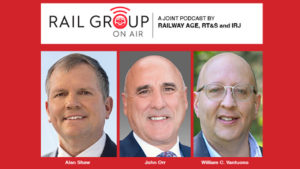USDOT proposes amendments to PTC regs
Written by jroodU.S. Department of Transportation has proposed changes to the Federal Railroad Administration's regulations governing the installation of Positive Train Control (PTC) systems. The amendments will provide greater flexibility to railroads and FRA in assessing the need for PTC without adversely affecting the safety of America's rail lines. "Ensuring the safety of our railroads is a top priority," said U.S. Transportation Secretary Ray LaHood. "Thanks to President Obama's leadership in reducing regulatory barriers, these proposed amendments will provide regulatory relief while maintaining our commitment to safety." PTC is currently required on routes carrying poison inhalation hazard (PIH) materials and on routes that provide intercity and commuter passenger service. If a railroad opts to reroute the shipment of PIH hazardous materials off such a rail line and chooses to not install PTC there, the company must currently request FRA approval and conduct a complex set of analyses. The amendments proposed would eliminate the need to perform those analyses but do not impact the existing requirements to install PTC on lines used to provide passenger rail service. "We believe that the proposal provides a balance of safety regulation and cost to the industry," said FRA Administrator Joseph Szabo. "We look forward to working together with the railroads as they concentrate on areas where positive train control is much-needed." Affected railroads are expected to have an estimated cost savings of $340 million in the first several years, with total savings of up to $1 billion over 20 years, by not installing PTC systems on as much as 14,000 miles of track. The lines impacted by this proposal have significantly less accident exposure because they do not carry passenger trains or PIH hazardous materials. The Notice of Proposed Rulemaking (NPRM) will be published in the Federal Register on Wednesday, August 24. The FRA invites comments on all aspects of the proposal. Interested parties are invited to submit comments by October 24. Comments received after that date will be considered to the extent possible without incurring additional expenses or delays.





